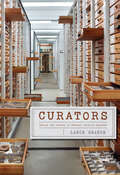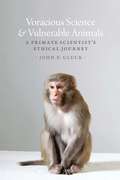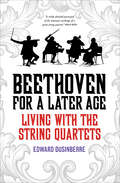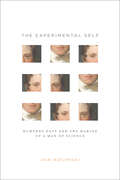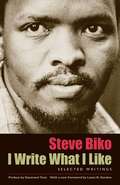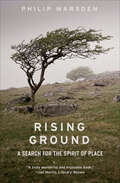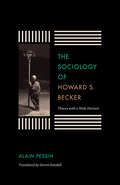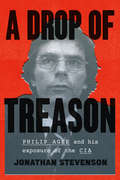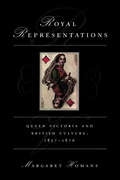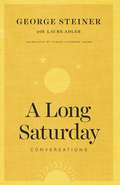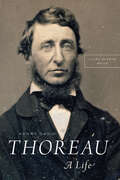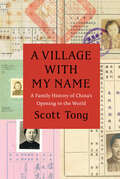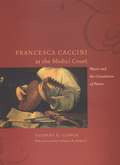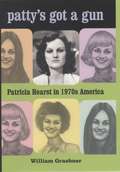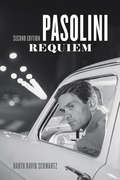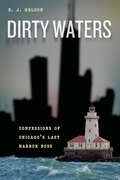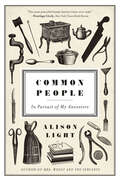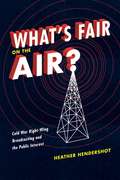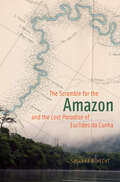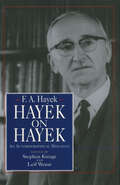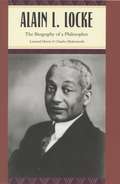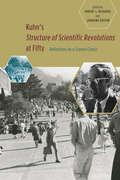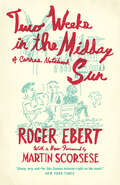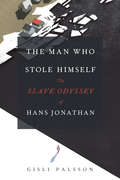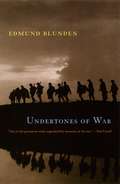- Table View
- List View
Curators: Behind the Scenes of Natural History Museums
by Lance GrandeOver the centuries, natural history museums have evolved from being little more than musty repositories of stuffed animals and pinned bugs, to being crucial generators of new scientific knowledge. They have also become vibrant educational centers, full of engaging exhibits that share those discoveries with students and an enthusiastic general public. At the heart of it all from the very start have been curators. Yet after three decades as a natural history curator, Lance Grande found that he still had to explain to people what he does. This book is the answer—and, oh, what an answer it is: lively, exciting, up-to-date, it offers a portrait of curators and their research like none we’ve seen, one that conveys the intellectual excitement and the educational and social value of curation. Grande uses the personal story of his own career—most of it spent at Chicago’s storied Field Museum—to structure his account as he explores the value of research and collections, the importance of public engagement, changing ecological and ethical considerations, and the impact of rapidly improving technology. Throughout, we are guided by Grande’s keen sense of mission, of a job where the why is always as important as the what. This beautifully written and richly illustrated book is a clear-eyed but loving account of natural history museums, their curators, and their ever-expanding roles in the twenty-first century.
Voracious Science & Vulnerable Animals: A Primate Scientist's Ethical Journey (Animal Lives Ser.)
by John P. GluckThe National Institute of Health recently announced its plan to retire the fifty remaining chimpanzees held in national research facilities and place them in sanctuaries. This significant decision comes after a lengthy process of examination and debate about the ethics of animal research. For decades, proponents of such research have argued that the discoveries and benefits for humans far outweigh the costs of the traumatic effects on the animals; but today, even the researchers themselves have come to question the practice. John P. Gluck has been one of the scientists at the forefront of the movement to end research on primates, and in Voracious Science and Vulnerable Animals he tells a vivid, heart-rending, personal story of how he became a vocal activist for animal protection. Gluck begins by taking us inside the laboratory of Harry F. Harlow at the University of Wisconsin, where Gluck worked as a graduate student in the 1960s. Harlow’s primate lab became famous for his behavioral experiments in maternal deprivation and social isolation of rhesus macaques. Though trained as a behavioral scientist, Gluck finds himself unable to overlook the intense psychological and physical damage these experiments wrought on the macaques. Gluck’s sobering and moving account reveals how in this and other labs, including his own, he came to grapple with the uncomfortable justifications that many researchers were offering for their work. As his sense of conflict grows, we’re right alongside him, developing a deep empathy for the often smart and always vulnerable animals used for these experiments. At a time of unprecedented recognition of the intellectual cognition and emotional intelligence of animals, Voracious Science and Vulnerable Animals is a powerful appeal for our respect and compassion for those creatures who have unwillingly dedicated their lives to science. Through the words of someone who has inflicted pain in the name of science and come to abhor it, it’s important to know what has led this far to progress and where further inroads in animal research ethics are needed.
Beethoven for a Later Age: Living with the String Quartets
by Edward Dusinberre&“A richly detailed portrayal of the intimate workings of a great string quartet . . . as revealed to us through the recollections of its first violinist.&”—Philip Roth Edward Dusinberre, first violinist of the renowned Takács Quartet, offers a rare peek inside the workings of his ensemble, while providing an insightful history of Beethoven&’s sixteen string quartets and their performance. Founded in Hungary in 1975 and now based in Boulder, Colorado, the Takács is one of the world&’s preeminent string quartets, and performances of Beethoven have been at the center of their work together for over forty years. Using the history of both the Takács Quartet and the Beethoven quartets as a foundation, Beethoven for a Later Age provides a backstage look at the daily life of a quartet, showing the necessary creative tension between individual and group and how four people can at the same time forge a lasting artistic connection and enjoy making music together over decades. In an accessible style, suitable for novices and chamber music enthusiasts alike, Dusinberre illuminates the variety and contradictions of Beethoven&’s quartets, which were composed against the turbulent backdrop of the Napoleonic Wars and their aftermath, and he brings the technical aspects of the music to life. &“We are given intimate insight into the almost impossible-to-describe musical process of rehearsal and performance, the artistic and human interaction that links these modern musicians with their forebears and Beethoven himself.&”—Garrick Ohlsson, pianist &“This singular memoir . . . will be something between informative and revelatory to readers from musicians to music lovers.&”—Jan Swafford, author of Beethoven: Anguish and Triumph
The Experimental Self: Humphry Davy and the Making of a Man of Science
by Jan GolinskiWhat did it mean to be a scientist before the profession itself existed? Jan Golinski finds an answer in the remarkable career of Humphry Davy, the foremost chemist of his day and one of the most distinguished British men of science of the nineteenth century. Originally a country boy from a modest background, Davy was propelled by his scientific accomplishments to a knighthood and the presidency of the Royal Society. An enigmatic figure to his contemporaries, Davy has continued to elude the efforts of biographers to classify him: poet, friend to Coleridge and Wordsworth, author of travel narratives and a book on fishing, chemist and inventor of the miners' safety lamp. What are we to make of such a man? In The Experimental Self, Golinski argues that Davy's life is best understood as a prolonged process of self-experimentation. He follows Davy from his youthful enthusiasm for physiological experiment through his self-fashioning as a man of science in a period when the path to a scientific career was not as well-trodden as it is today. What emerges is a portrait of Davy as a creative fashioner of his own identity through a lifelong series of experiments in selfhood.
I Write What I Like: Selected Writings
by Steve Biko"The most potent weapon in the hands of the oppressor is the mind of the oppressed." Like all of Steve Biko's writings, those words testify to the passion, courage, and keen insight that made him one of the most powerful figures in South Africa's struggle against apartheid. They also reflect his conviction that black people in South Africa could not be liberated until they united to break their chains of servitude, a key tenet of the Black Consciousness movement that he helped found.I Write What I Like contains a selection of Biko's writings from 1969, when he became the president of the South African Students' Organization, to 1972, when he was prohibited from publishing. The collection also includes a preface by Archbishop Desmond Tutu; an introduction by Malusi and Thoko Mpumlwana, who were both involved with Biko in the Black Consciousness movement; a memoir of Biko by Father Aelred Stubbs, his longtime pastor and friend; and a new foreword by Professor Lewis Gordon. Biko's writings will inspire and educate anyone concerned with issues of racism, postcolonialism, and black nationalism.
Rising Ground: A Search for the Spirit of Place
by Philip MarsdenThe travel writer and Cornwall native explores his home on a journey by foot to Land&’s End in this &“fascinating and hauntingly evocative&” memoir (Literary Review). A Guardian, Financial Times, Observer, and Scotsman Book of the Year In 2010, Philip Marsden moved with his family to a rundown farmhouse in Cornwall, England. From the moment he arrived, Marsden was fascinated by the landscape and the traces of human history all around him. Wanting to experience the place more fully, he set out to walk across Cornwall, to the evocatively named Land&’s End. Rising Ground is a record of that journey, but it is also so much more: a beautifully written meditation on place, nature, and human life that encompasses history, archaeology, geography, and the love of place that suffuses us when we finally find home. Firmly in a storied tradition of English nature writing that stretches from Gilbert White to Helen MacDonald, Rising Ground reveals the ways that places and peoples have interacted over time, from standing stones to footpaths, ancient habitations to modern highways. What does it mean to truly live in a place, and what does it take to understand, and honor, those who lived and died there long before we arrived? "A fascinating study of place and its meaning."—Observer, UK
The Sociology of Howard S. Becker: Theory with a Wide Horizon
by Steven Rendall Alain PessinHoward S. Becker is a name to conjure with on two continents —in the United States and in France. He has enjoyed renown in France for his work in sociology, which in the United States goes back more than fifty years to pathbreaking studies of deviance, professions, sociology of the arts, and a steady stream of books and articles on method. Becker, who lives part of the year in Paris, is by now part of the French intellectual scene, a street-smart jazz pianist and sociologist who offers an answer to the stifling structuralism of Pierre Bourdieu. French fame has brought French analysis, including The Sociology of Howard S. Becker, written by Alain Pessin and translated into English by Steven Rendall. The book is an exploration of Becker’s major works as expressions of the freedom of possibility within a world of collaborators. Pessin reads Becker’s work as descriptions and ideas that show how society can embody the possibilities of change, of doing things differently, of taking advantage of opportunities for free action. The book is itself a kind of collaboration—Pessin and Becker in dialogue. The Sociology of Howard S. Becker is a meeting of two cultures via two great sociological minds in conversation.
A Drop of Treason: Philip Agee and His Exposure of the CIA
by Jonathan StevensonPhilip Agee’s story is the stuff of a John le Carré novel—perilous and thrilling adventures around the globe. He joined the CIA as a young idealist, becoming an operations officer in hopes of seeing the world and safeguarding his country. He was the consummate intelligence insider, thoroughly entrenched in the shadow world. But in 1975, he became the first such person to publicly betray the CIA—a pariah whose like was not seen again until Edward Snowden. For almost forty years in exile, he was a thorn in the side of his country. The first biography of this contentious, legendary man, Jonathan Stevenson’s A Drop of Treason is a thorough portrait of Agee and his place in the history of American foreign policy and the intelligence community during the Cold War and beyond. Unlike mere whistleblowers, Agee exposed American spies by publicly blowing their covers. And he didn’t stop there—his was a lifelong political struggle that firmly allied him with the social movements of the global left and against the American project itself from the early 1970s on. Stevenson examines Agee’s decision to turn, how he sustained it, and how his actions intersected with world events. Having made profound betrayals and questionable decisions, Agee lived a rollicking, existentially fraught life filled with risk. He traveled the world, enlisted Gabriel García Márquez in his cause, married a ballerina, and fought for what he believed was right. Raised a conservative Jesuit in Tampa, he died a socialist expat in Havana. In A Drop of Treason, Stevenson reveals what made Agee tick—and what made him run.
Royal Representations: Queen Victoria and British Culture, 1837-1876
by Margaret HomansQueen Victoria was one of the most complex cultural productions of her age. In Royal Representations, Margaret Homans investigates the meanings Victoria held for her times, Victoria's own contributions to Victorian writing and art, and the cultural mechanisms through which her influence was felt. Arguing that being, seeming, and appearing were crucial to Victoria's "rule," Homans explores the variability of Victoria's agency and of its representations using a wide array of literary, historical, and visual sources. Along the way she shows how Victoria provided a deeply equivocal model for women's powers in and out of marriage, how Victoria's dramatic public withdrawal after Albert's death helped to ease the monarchy's transition to an entirely symbolic role, and how Victoria's literary self-representations influenced debates over political self-representation. Homans considers versions of Victoria in the work of Elizabeth Barrett Browning, George Eliot, John Ruskin, Margaret Oliphant, Lewis Carroll, Alfred Lord Tennyson, and Julia Margaret Cameron.
A Long Saturday: Conversations
by George Steiner Laure AdlerGeorge Steiner is one of the preeminent intellectuals of our time. The Washington Post has declared that no one else “writing on literature can match him as polymath and polyglot, and few can equal the verve and eloquence of his writing,” while the New York Times says of his works that “the erudition is almost as extraordinary as the prose: dense, knowing, allusive.” Reading in many languages, celebrating the survival of high culture in the face of modern barbarisms, Steiner probes the ethics of language and literature with unparalleled grace and authority. A Long Saturday offers intimate insight into the questions that have absorbed him throughout his career. In a stimulating series of conversations, Steiner and journalist Laure Adler discuss a range of topics, including Steiner’s boyhood in Vienna and Paris, his education at the University of Chicago and Harvard, and his early years in academia. Books are a touchstone throughout, but Steiner and Adler’s conversations also range over music, chess, psychoanalysis, the place of Israel in Jewish life, and beyond. Blending thoughts on subjects of broad interest in the humanities—the issue of honoring Richard Wagner and Martin Heidegger in spite of their politics, or Virginia Woolf’s awareness of the novel as a multivocal form, for example—with personal reflections on life and family, Steiner demonstrates why he is considered one of today’s greatest minds. Revealing and exhilarating, A Long Saturday invites readers to pull up a chair and listen in on a conversation with a master.
Henry David Thoreau: A Life (Science And Literature Ser.)
by Laura Dassow Walls“Walden. Yesterday I came here to live.” That entry from the journal of Henry David Thoreau, and the intellectual journey it began, would by themselves be enough to place Thoreau in the American pantheon. His attempt to “live deliberately” in a small woods at the edge of his hometown of Concord has been a touchstone for individualists and seekers since the publication of Walden in 1854. But there was much more to Thoreau than his brief experiment in living at Walden Pond. A member of the vibrant intellectual circle centered on his neighbor Ralph Waldo Emerson, he was also an ardent naturalist, a manual laborer and inventor, a radical political activist, and more. Many books have taken up various aspects of Thoreau’s character and achievements, but, as Laura Dassow Walls writes, “Thoreau has never been captured between covers; he was too quixotic, mischievous, many-sided.” Two hundred years after his birth, and two generations after the last full-scale biography, Walls restores Henry David Thoreau to us in all his profound, inspiring complexity. Walls traces the full arc of Thoreau’s life, from his early days in the intellectual hothouse of Concord, when the American experiment still felt fresh and precarious, and “America was a family affair, earned by one generation and about to pass to the next.” By the time he died in 1862, at only forty-four years of age, Thoreau had witnessed the transformation of his world from a community of farmers and artisans into a bustling, interconnected commercial nation. What did that portend for the contemplative individual and abundant, wild nature that Thoreau celebrated? Drawing on Thoreau’s copious writings, published and unpublished, Walls presents a Thoreau vigorously alive in all his quirks and contradictions: the young man shattered by the sudden death of his brother; the ambitious Harvard College student; the ecstatic visionary who closed Walden with an account of the regenerative power of the Cosmos. We meet the man whose belief in human freedom and the value of labor made him an uncompromising abolitionist; the solitary walker who found society in nature, but also found his own nature in the society of which he was a deeply interwoven part. And, running through it all, Thoreau the passionate naturalist, who, long before the age of environmentalism, saw tragedy for future generations in the human heedlessness around him. “The Thoreau I sought was not in any book, so I wrote this one,” says Walls. The result is a Thoreau unlike any seen since he walked the streets of Concord, a Thoreau for our time and all time.
A Village with My Name: A Family History of China's Opening to the World
by Scott TongWhen journalist Scott Tong moved to Shanghai, his assignment was to start up the first full-time China bureau for “Marketplace,” the daily business and economics program on public radio stations across the United States. But for Tong the move became much more—it offered the opportunity to reconnect with members of his extended family who had remained in China after his parents fled the communists six decades prior. By uncovering the stories of his family’s history, Tong discovered a new way to understand the defining moments of modern China and its long, interrupted quest to go global. A Village with My Name offers a unique perspective on the transitions in China through the eyes of regular people who have witnessed such epochal events as the toppling of the Qing monarchy, Japan’s occupation during World War II, exile of political prisoners to forced labor camps, mass death and famine during the Great Leap Forward, market reforms under Deng Xiaoping, and the dawn of the One Child Policy. Tong’s story focuses on five members of his family, who each offer a specific window on a changing country: a rare American-educated girl born in the closing days of the Qing Dynasty, a pioneer exchange student, an abandoned toddler from World War II who later rides the wave of China’s global export boom, a young professional climbing the ladder at a multinational company, and an orphan (the author’s daughter) adopted in the middle of a baby-selling scandal fueled by foreign money. Through their stories, Tong shows us China anew, visiting former prison labor camps on the Tibetan plateau and rural outposts along the Yangtze, exploring the Shanghai of the 1930s, and touring factories across the mainland. With curiosity and sensitivity, Tong explores the moments that have shaped China and its people, offering a compelling and deeply personal take on how China became what it is today.
Francesca Caccini at the Medici Court: Music and the Circulation of Power (Women In Culture And Society Ser.)
by Suzanne G. CusickA &“priceless&” study of the life and career of the Renaissance-era Italian who was the first woman to have composed an opera (Gender & History).&“Extraordinary in its breadth, its detail, its insight, and its worth to all participants in early music…. Its contribution is not limited to the musical world, however, as Cusick&’s remarkable command and analysis of her material…has immense value for scholars engaged in cultural studies, performance studies, history, politics, or the study of difference.&”—Renaissance Quarterly A contemporary of Shakespeare and Monteverdi, and a colleague of Galileo and Artemisia Gentileschi at the Medici court, Francesca Caccini was a dominant musical figure there for thirty years. Dazzling listeners with the transformative power of her performances and the sparkling wit of the music she composed for more than a dozen court theatricals, Caccini is best remembered today as the first woman to have composed opera. Francesca Caccini at the Medici Court reveals for the first time how this multitalented composer established a fully professional musical career at a time when virtually no other women were able to achieve comparable success. Suzanne G. Cusick argues that Caccini&’s career depended on the usefulness of her talents to the political agenda of Grand Duchess Christine de Lorraine, Tuscany&’s de facto regent from 1606 to 1636. Drawing on Classical and feminist theory, Cusick shows how the music Caccini made for the Medici court sustained the culture that enabled Christine&’s power, thereby also supporting the sexual and political aims of its women. In bringing Caccini&’s surprising story so vividly to life, Cusick ultimately illuminates how music making functioned in early modern Italy as a significant medium for the circulation of power.
Patty's Got a Gun: Patricia Hearst in 1970s America
by William GraebnerIt was a story so bizarre it defied belief: in April 1974, twenty-year-old newspaper heiress Patricia Hearst robbed a San Francisco bank in the company of members of the Symbionese Liberation Army—who had kidnapped her a mere nine weeks earlier. But the robbery—and the spectacular 1976 trial that ended with Hearst’s criminal conviction—seemed oddly appropriate to the troubled mood of the nation, an instant exemplar of a turbulent era. With Patty’s Got a Gun, the first substantial reconsideration of Patty Hearst’s story in more than twenty-five years, William Graebner vividly re-creates the atmosphere of uncertainty and frustration of mid-1970s America. Drawing on copious media accounts of the robbery and trial—as well as cultural artifacts from glam rock to Invasion of the Body Snatchers—Graebner paints a compelling portrait of a nation confused and frightened by the upheavals of 1960s liberalism and beginning to tip over into what would become Reagan-era conservatism, with its invocations of individual responsibility and the heroic. Trapped in the middle of that shift, the affectless, zombielike, “brainwashed” Patty Hearst was a ready-made symbol of all that seemed to have gone wrong with the sixties—the inevitable result, some said, of rampant permissiveness, feckless elitism, the loss of moral clarity, and feminism run amok. By offering a fresh look at Patty Hearst and her trial—for the first time free from the agendas of the day, yet set fully in their cultural context—Patty’s Got a Gun delivers a nuanced portrait of both an unforgettable moment and an entire era, one whose repercussions continue to be felt today.
Pasolini Requiem: Second Edition
by Barth David SchwartzPier Paolo Pasolini (1922–75) was one of the most important Italian intellectuals of the post–World War II era. An astonishing polymath—poet, novelist, literary critic, political polemicist, screenwriter, and film director—he exerted profound influence on Italian culture up to his untimely death at the age of fifty-three. This revised edition of what the New York Times Book Review has called “the standard Pasolini biography” introduces the artist to a new generation of readers. Based on extensive interviews with those who knew Pasolini, both friends and enemies, admirers and detractors, Pasolini Requiem chronicles his growth from poet in the provinces to Italy’s leading “civil poet”; his flight to Rome in 1950; the scandalous success of his two novels and political writing; and his transition to film, where he started as a contributor to the golden age of Italian cinema and ended with the shocking Salò, or the 120 Days of Sodom. Pasolini’s tragic and still unsolved murder has remained a subject of contentious debate for four decades. The enduring fascination with who committed the crime—and why—reflects his vital stature in Italy’s political and social history. Updated throughout and with a new afterword covering the efforts to reopen the investigation—and the legal maelstrom surrounding Pasolini’s demise—this edition of Pasolini Requiem is a riveting account of one of the twentieth century’s most controversial, ever-present iconoclasts.
Dirty Waters: Confessions of Chicago's Last Harbor Boss
by R. J. NelsonIn 1987, the city of Chicago hired a former radical college chaplain to clean up rampant corruption on the waterfront. R. J. Nelson thought he was used to the darker side of the law--he had been followed by federal agents and wiretapped due to his antiwar stances in the sixties--but nothing could prepare him for the wretched bog that constituted the world of a Harbor Boss. Director of Harbors and Marine Services was a position so mired in corruption that its previous four directors ended up in federal prison. Nelson inherited angry constituents, prying journalists, shell-shocked employees, and a tobacco-stained office still bearing a busted door that had been smashed in by the FBI. Undeterred, Nelson made it his personal mission to become a "pneumacrat," a public servant who, for the common good, always follows the spirit--if not always the letter--of the law. Dirty Waters is a wry, no-holds-barred memoir of Nelson's time controlling some of the city's most beautiful spots while facing some of its ugliest traditions. A guide like no other, Nelson takes us through Chicago's beloved "blue spaces" and deep into the city's political morass. He reveals the different moralities underlining three mayoral administrations, from Harold Washington to Richard M. Daley, and navigates us through the gritty mechanisms of the Chicago machine. He also deciphers the sometimes insular world of boaters and their fraught relationship with their land-based neighbors. Ultimately, Dirty Waters is a tale of morality, of what it takes to be a force for good in the world and what struggles come from trying to stay ethically afloat in a sea of corruption.
Common People: In Pursuit of My Ancestors
by Alison Light"Family history begins with missing persons," Alison Light writes in Common People. We wonder about those we've lost, and those we never knew, about the long skein that led to us, and to here, and to now. So we start exploring. Most of us, however, give up a few generations back. We run into a gap, get embarrassed by a ne'er-do-well, or simply find our ancestors are less glamorous than we'd hoped. That didn't stop Alison Light: in the last weeks of her father's life, she embarked on an attempt to trace the history of her family as far back as she could reasonably go. The result is a clear-eyed, fascinating, frequently moving account of the lives of everyday people, of the tough decisions and hard work, the good luck and bad breaks, that chart the course of a life. Light's forebears--servants, sailors, farm workers--were among the poorest, traveling the country looking for work; they left few lasting marks on the world. But through her painstaking work in archives, and her ability to make the people and struggles of the past come alive, Light reminds us that "every life, even glimpsed through the chinks of the census, has its surprises and secrets. " What she did for the servants of Bloomsbury in her celebrated Mrs. Woolf and the Servants Light does here for her own ancestors, and, by extension, everyone's: draws their experiences from the shadows of the past and helps us understand their lives, estranged from us by time yet inextricably interwoven with our own. Family history, in her hands, becomes a new kind of public history.
What's Fair on the Air?: Cold War Right-Wing Broadcasting and the Public Interest
by Heather HendershotThe rise of right-wing broadcasting during the Cold War has been mostly forgotten today. But in the 1950s and ’60s you could turn on your radio any time of the day and listen to diatribes against communism, civil rights, the United Nations, fluoridation, federal income tax, Social Security, or JFK, as well as hosannas praising Barry Goldwater and Jesus Christ. Half a century before the rise of Rush Limbaugh and Glenn Beck, these broadcasters bucked the FCC’s public interest mandate and created an alternate universe of right-wing political coverage, anticommunist sermons, and pro-business bluster. A lively look back at this formative era, What’s Fair on the Air? charts the rise and fall of four of the most prominent right-wing broadcasters: H. L. Hunt, Dan Smoot, Carl McIntire, and Billy James Hargis. By the 1970s, all four had been hamstrung by the Internal Revenue Service, the FCC’s Fairness Doctrine, and the rise of a more effective conservative movement. But before losing their battle for the airwaves, Heather Hendershot reveals, they purveyed ideological notions that would eventually triumph, creating a potent brew of religion, politics, and dedication to free-market economics that paved the way for the rise of Ronald Reagan, the Moral Majority, Fox News, and the Tea Party.
The Scramble for the Amazon and the Lost Paradise of Euclides da Cunha
by Susanna B. HechtA “compelling and elegantly written” history of the fight for the Amazon basin and the work of a brilliant but overlooked Brazilian intellectual (Times Literary Supplement, UK).The fortunes of the late nineteenth century’s imperial powers depended on a single raw material—rubber—with only one source: the Amazon basin. This scenario ignited a decades-long conflict that found Britain, France, Belgium, and the United States fighting with and against the new nations of Peru, Bolivia, and Brazil for the forest’s riches. In the midst of this struggle, the Brazilian author and geographer Euclides da Cunha led a survey expedition to the farthest reaches of the river. The Scramble for the Amazon tells the story of da Cunha’s terrifying journey, the unfinished novel born from it, and the global strife that formed the backdrop for both. Haunted by his broken marriage, da Cunha trekked through a beautiful region thrown into chaos by guerrilla warfare, starving migrants, and native slavery. All the while, he worked on his masterpiece, a nationalist synthesis of geography, philosophy, biology, and journalism entitled Lost Paradise. Hoping to unveil the Amazon’s explorers, spies, natives, and brutal geopolitics, Da Cunha was killed by his wife’s lover before he could complete his epic work. once the biography of Da Cunha, a translation of his unfinished work, and a chronicle of the social, political, and environmental history of the Amazon, The Scramble for the Amazon is a work of thrilling intellectual ambition.
Hayek on Hayek: An Autobiographical Dialogue ( The Collected Works of F. A. Hayek)
by F. A. HayekThe crumbling of the Berlin Wall, the fall of the iron curtain, and the Reagan and Thatcher "revolutions" all owe a tremendous debt to F. A. Hayek. Economist, social and political theorist, and intellectual historian, Hayek passionately championed individual liberty and condemned the dangers of state control. Now Hayek at last tells the story of his long and controversial career, during which his fortunes rose, fell, and finally rose again. Through a complete collection of previously unpublished autobiographical sketches and a wide selection of interviews, Hayek on Hayek provides the first detailed chronology of Hayek's early life and education, his intellectual progress, and the academic and public reception of his ideas. His discussions range from economic methodology and the question of religious faith to the atmosphere of post-World War I Vienna and the British character. Born in 1899 into a Viennese family of academics and civil servants, Hayek was educated at the University of Vienna, fought in the Great War, and later moved to London, where, as he watched liberty vanish under fascism and communism across Europe, he wrote The Road to Serfdom. Although this book attracted great public attention, Hayek was ignored by other economists for thirty years after World War II, when European social democracies boomed and Keynesianism became the dominant intellectual force. However, the award of the Nobel Prize in economics for 1974 signaled a reversal in Hayek's fortunes, and before his death in 1992 he saw his life's work vindicated in the collapse of the planned economies of Eastern Europe.Hayek on Hayek is as close to an autobiography of Hayek as we will ever have. In his own eloquent words, Hayek reveals the remarkable life of a revolutionary thinker in revolutionary times. "One of the great thinkers of our age who explored the promise and contours of liberty....[Hayek] revolutionized the world's intellectual and political life"—President George Bush, on awarding F. A. Hayek the Medal of Freedom F. A. Hayek, recipient of the Medal of Freedom 1991 and the Nobel Memorial Prize in Economics in 1974, was a pioneer in monetary theory and the principal proponent of the libertarian philosophy. Hayek is the author of numerous books in economics, as well as books in political philosophy and psychology.
Alain L. Locke: Biography of a Philosopher
by Leonard Harris Charles MolesworthAlain L. Locke (1886-1954), in his famous 1925 anthology "The New Negro", declared that "the pulse of the Negro world has begun to beat in Harlem". Often called the father of the Harlem Renaissance, Locke had his finger directly on that pulse, promoting, influencing, and sparring. Leonard Harris and Charles Molesworth trace Locke's story through his Philadelphia upbringing, his undergraduate years at Harvard and his tenure as the first African American Rhodes Scholar. The heart of their narrative illuminates Locke's heady years in 1920s New York City and his forty-year career at Howard University, where he helped spearhead the adult education movement of the 1930s and wrote on topics ranging from the philosophy of value to the theory of democracy. Harris and Molesworth show that throughout this illustrious career -- despite a formal manner that many observers interpreted as elitist or distant -- Locke remained a warm and effective teacher and mentor, as well as a fierce champion of literature and art as means of breaking down barriers between communities. The multifaceted portrait that emerges from this engaging account effectively reclaims Locke's rightful place in the pantheon of America's most important minds.
Kuhn's Structure of Scientific Revolutions at Fifty
by Robert J. Richards Lorraine DastonThomas S. Kuhn's The Structure of Scientific Revolutions was a watershed event when it was published in 1962, upending the previous understanding of science as a slow, logical accumulation of facts and introducing, with the concept of the "paradigm shift," social and psychological considerations into the heart of the scientific process. More than fifty years after its publication, Kuhn's work continues to influence thinkers in a wide range of fields, including scientists, historians, and sociologists. It is clear that The Structure of Scientific Revolutions itself marks no less of a paradigm shift than those it describes. In Kuhn's "Structure of Scientific Revolutions" at Fifty, leading social scientists and philosophers explore the origins of Kuhn's masterwork and its legacy fifty years on. These essays exhume important historical context for Kuhn's work, critically analyzing its foundations in twentieth-century science, politics, and Kuhn's own intellectual biography: his experiences as a physics graduate student, his close relationship with psychologists before and after the publication of Structure, and the Cold War framework of terms such as "world view" and "paradigm."
Two Weeks in the Midday Sun: A Cannes Notebook
by Roger EbertA paragon of cinema criticism for decades, Roger Ebert—with his humor, sagacity, and no-nonsense thumb—achieved a renown unlikely ever to be equaled. His tireless commentary has been greatly missed since his death, but, thankfully, in addition to his mountains of daily reviews, Ebert also left behind a legacy of lyrical long-form writing. And with Two Weeks in the Midday Sun, we get a glimpse not only into Ebert the man, but also behind the scenes of one of the most glamorous and peculiar of cinematic rituals: the Cannes Film Festival. More about people than movies, this book is an intimate, quirky, and witty account of the parade of personalities attending the 1987 festival—Ebert’s twelfth, and the fortieth anniversary of the event. A wonderful raconteur with an excellent sense of pacing, Ebert presents lighthearted ruminations on his daily routine and computer troubles alongside more serious reflection on directors such as Fellini and Coppola, screenwriters like Charles Bukowski, actors such as Isabella Rossellini and John Malkovich, the very American press agent and social maverick Billy “Silver Dollar” Baxter, and the stylishly plunging necklines of yore. He also comments on the trajectory of the festival itself and the “enormous happiness” of sitting, anonymous and quiet, in an ordinary French café. And, of course, he talks movies. Illustrated with Ebert’s charming sketches of the festival and featuring both a new foreword by Martin Scorsese and a new postscript by Ebert about an eventful 1997 dinner with Scorsese at Cannes, Two Weeks in the Midday Sun is a small treasure, a window onto the mind of this connoisseur of criticism and satire, a man always so funny, so un-phony, so completely, unabashedly himself.
The Man Who Stole Himself: The Slave Odyssey of Hans Jonathan
by Gisli PalssonThe island nation of Iceland is known for many things--majestic landscapes, volcanic eruptions, distinctive seafood--but racial diversity is not one of them. So the little-known story of Hans Jonathan, a free black man who lived and raised a family in early nineteenth-century Iceland, is improbable and compelling, the stuff of novels. In The Man Who Stole Himself, Gisli Palsson lays out the story of Hans Jonathan (also known as Hans Jónatan) in stunning detail. Born into slavery in St. Croix in 1784, Hans was taken as a slave to Denmark, where he eventually enlisted in the navy and fought on behalf of the country in the 1801 Battle of Copenhagen. After the war, he declared himself a free man, believing that he was due freedom not only because of his patriotic service, but because while slavery remained legal in the colonies, it was outlawed in Denmark itself. He thus became the subject of one of the most notorious slavery cases in European history, which he lost. Then Hans ran away--never to be heard from in Denmark again, his fate unknown for more than two hundred years. It's now known that Hans fled to Iceland, where he became a merchant and peasant farmer, married, and raised two children. Today, he has become something of an Icelandic icon, claimed as a proud and daring ancestor both there and among his descendants in America. The Man Who Stole Himself brilliantly intertwines Hans Jonathan's adventurous travels with a portrait of the Danish slave trade, legal arguments over slavery, and the state of nineteenth-century race relations in the Northern Atlantic world. Throughout the book, Palsson traces themes of imperial dreams, colonialism, human rights, and globalization, which all come together in the life of a single, remarkable man. Hans literally led a life like no other. His is the story of a man who had the temerity--the courage--to steal himself.
Undertones of War
by Edmund BlundenThis military memoir from the six-time Nobel Prize nominated poet and British WWI soldier is &“one of the permanent works engendered by the memories of war&” (Paul Fussell, National Book Award-winning author of The Great War and Modern Memory). &“I took my road with no little pride of fear; one morning I feared very sharply, as I saw what looked like a rising shroud over a wooden cross in the clustering mist. Horror! But on a closer study I realized that the apparition was only a flannel gas helmet. . . . What an age since 1914!&” In Undertones of War, one of the finest autobiographies to come out of World War I, the acclaimed poet Edmund Blunden records his devastating experiences in combat. After enlisting at the age of twenty, he took part in the disastrous battles at the Somme, Ypres, and Passchendaele, describing them as &“murder, not only to the troops but to their singing faiths and hopes.&” All the horrors of trench warfare, all the absurdity and feeble attempts to make sense of the fighting, all the strangeness of observing war as a writer—of being simultaneously soldier and poet—pervade Blunden&’s memoir. In steely-eyed prose as richly allusive as any poetry, he tells of the endurance and despair found among the men of his battalion, including the harrowing acts of bravery that won him the Military Cross. Now back in print for American readers, the volume includes a selection of Blunden&’s war poems that unflinchingly juxtapose death in the trenches with the beauty of Flanders&’s fields. Undertones of War deserves a place on the bookshelves of military buffs and poetry lovers.
